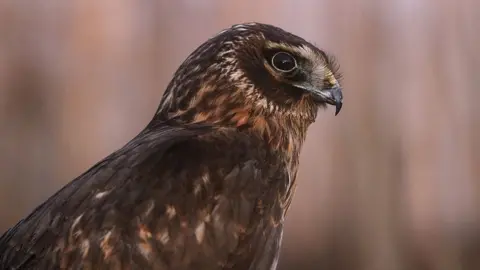Hen harriers 'vanishing due to illegal killing' - study
 SPL
SPLHen harriers are disappearing on English grouse moors due to illegal killing, according to a scientific study.
The birds of prey are one of England's rarest birds, and a protected species.
Data gathered over a decade found satellite-tagged hen harriers were ten times more likely to die or vanish when they were on or near areas used for shooting.
Researchers say there is no plausible explanation other than illegal killing.
The analyses "confirm what has long been suspected - that illegal persecution is having a major impact on the conservation status of this bird," said co-researcher Stephen Murphy from the wildlife body, Natural England.
What did the study find?
The study found that four of 58 satellite-tagged hen harriers were illegally killed, while 38 simply disappeared, which "strongly suggests destruction of the tag and removal of the carcass".
The survival rate of juvenile hen harriers in England was 17%. This compares with survival rates on the Orkney Islands, where there are no managed grouse moors, of 37 - 54%.
 Getty Images
Getty ImagesThe Moorland Association, which manages moorland in England and Wales for wild red grouse, said when a satellite tag fails unexpectedly, persecution may be a factor.
Commenting on the study, director Amanda Anderson said: "Persecution should not occur and must cease in order to give hen harriers the best chance of survival."
The British Association for Shooting and Conservation said raptor persecution risked "terminal damage" to shooting.
"Satellite tags are a tool in the fight against raptor persecution," said executive director of conservation Caroline Bedell. "We have to make sure there is no place left for criminals to hide."
The paper, published in the journal Nature Communications, relates to satellite-tagged hen harrier disappearances between 2007 and 2017 in England.
"We conclude that the increased likelihood of mortality is associated with illegal killing of this species on grouse moors," said the researchers, from the University of Cape Town, University of Aberdeen, Natural England and RSPB, Scotland.
Follow Helen on Twitter.
